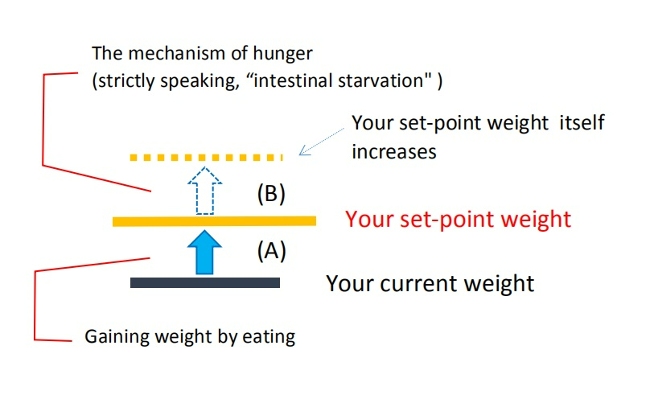Topics
06/22/2019
Obesity as a Multifactorial Disease: "Confounding Factors" in Environmental Influences
-
Contents
-
- "Overeating causes obesity" is too simplistic
- Can environmental and behavioral factors be identified?
- Intestinal starvation can be considered a “confounding factor”
<The bottom line>
1. "Overeating causes obesity" is too simplistic
Reuters and the market research firm Ipsos conducted an online poll in the United States in 2012 with 1,143 adults. The poll found that 61% of American adults believed that "personal choices about eating and exercise" were responsible for the obesity epidemic[1,2]. Many Americans still hold the belief that people who become obese lack willpower, overeat, and don't exercise enough[2].
Similarly, in Japan, even news anchors and experts frequently make statements like, "It's only natural to gain weight if you overeat and don’t exercise." This suggests that many Japanese people likely hold the same belief.
However, scientific research indicates that "personal choices" may not account for all cases of obesity[2].
Classical genetic studies based on adoption studies, family studies, twin studies, etc., indicate that about 50–70% of the variance (heritability estimates) in BMI is genetic (Those estimates vary depending on the study design and assessment methods) [3].
(Note: In the following article, I explain that raising children in different home environments does not necessarily constitute “environmental changes” that alter their set-point weight.)
[Related article]
Does Obesity Run in the Family or Is It Due to the Living Environment?

Even today, the heritability of obesity is estimated at 40% to 70%[4].
Some researchers point out that numerous different genes have been found to be involved in food selection, food intake, absorption, metabolism, and energy expenditure including physical activity. When considering interactions between gene-by-gene or gene(s)-by-environment(s), the complexity of the mechanisms underlying weight regulation becomes even greater[3].
In a 1998 report published by the U.S. National Institutes of Health (NIH), experts at the time described obesity as a complex, multifactorial chronic disease that develops from an interaction between genotype and the environment (Taubes G. 2010. Why we get fat. Page 76).
In 2012, the American Association of Clinical Endocrinology (AACE) also designated obesity as a chronic disease.
This designation was based on two key points : first, like other chronic diseases, the pathophysiology of obesity is complex, involving interactions among genes, biological factors, the environment, and behavior; second, obesity meets the three criteria that constitute a disease as defined by the American Medical Association[5].
2. Can environmental and behavioral factors be identified?
Assuming that human genes as a whole are unlikely to undergo significant changes over a short span of 50 or 100 years, I believe that the global rise in obesity since the 1970’s is largely attributable to environmental and behavioral factors. I would like to explore this in greater detail.
I will quote an interesting description that is relevant to my blog.
“What causes weight gain? Contending theories abound:
・Calories ・Food reward・Food addiction
・Sugar・Sleep deprivation ・Stress
・Refined carbohydrates・Wheat
・Low fiber intake・All carbohydrates
・Genetics・Dietary fat ・Red meat
・Poverty ・All meat・Wealth
・Dairy products・Gut microbiome
・Snacking・Childhood obesity

The various theories fight among themselves, as if they are all mutually exclusive and there is only one true cause of obesity. For example, recent trials that compare a low-calorie to a low-carbohydrate diet assume that if one is correct, the other is not. Most obesity research is conducted in this manner.
This approach is wrong, since these theories all contain some element of truth."
(Jason Fung. 2016. The Obesity Code. Page 70.)
"THE MULTIFACTORIAL NATURE of obesity is the crucial missing link. There is no one single cause of obesity. (*snip*)
What we need is a frame work, a structure, a coherent theory to understand how all its factors fit together. Too often, our current model of obesity assumes that there is only one single true cause, and that all others are pretenders to the throne. Endless debates ensue.
Too many calories cause obesity. No, too many carbohydrates. No,
too much saturated fat. No, too much red meat. No,
too much processed foods. No, too much high fat dairy. No,
too much wheat. No, too much sugar. No,
too much highly palatable foods. No, too much eating out. No
It goes on and on. They are all partially correct. (*snip*)
All diets (e.g., calorie restriction, low-fat, paleo, vegan) work because they all address a different aspect of the disease. But none of them work for very long, because none of them address the totality of the disease.
Without understanding the multifactorial nature of obesity-which is critical -we are doomed to an endless cycle of blame."
(Jason Fung. The Obesity Code. Pages 216-217.)
I think the author provides a keen insight into the multifactorial nature of obesity. We must first understand that being overweight is not as simple as "it happens because we overeat," but arises from a complex interplay of various factors.
However, what I want to emphasize is that, based on my intestinal starvation idea, these complex environmental and behavioral factors can be consolidated to some extent, which means that while those factors often blamed as causes of obesity appear intertwined and hard to explain, if we focus on the unseen workings of the intestines, the underlying causes will become much clearer.
3. Intestinal starvation can be considered a “confounding factor”
As I’ve already explained, please understand that the phrase “gaining weight” has two meanings.
【related article】
Two Meanings to the Phrase "Gaining Weight"
The mechanism that many people refer to as “get fat by eating a lot” is in the range of (A) in the graph below.
Moreover, I think that most of the Intervention studies on obesity so far have only been comparative studies that involve reducing the intake of calories, regulating the amount of carbs or fat, or increasing exercise, etc. The experiment they are doing is also in the range of (A).

Of course, everyone will lose some weight if they reduce their caloric intake and incorporate exercise, although individual differences may vary.
However, that is not the fundamental way to deal with being overweight, as Dr. Fung mentioned, so regaining weight (the rebound effect) is inevitable if you eat as before.
▽In contrast, when (B) the 'set-point' for body weight goes up by intestinal starvation, there are various interrelated factors.
For instance, it is said that the following affects weight gain:
・Skipping breakfast ・Late dinner ・How many meals you eat
・Refined carbohydrates ・Processed food
・Lack of fiber intake ・Unbalanced diets
These are some of factors that are related to part (B) of the graph.
The important thing here is that each of these factors seems to be linked to weight gain, but there is no causality between each factor and outcome. Rather, they are related to inducing intestinal starvation, and intestinal starvation has a causal relationship with obesity (In this case, some may say intestinal starvation can be the “confounding factor”).

As I’ve already explained in another article, a combination of some of these factors below (from category 1 to 4 of the table) happening simultaneously or overlapping, can cause intestinal starvation, and the occurrence of intestinal starvation may be pinpointed in the unseen workings of the entire intestinal track (or it may be the small intestine only).
[Related article]
Three (+one) Factors to Accelerate “Intestinal Starvation”

The bottom line
(1)Our understanding of how and why obesity occurs is still incomplete. There is a growing societal acceptance of the idea that obesity, like other chronic diseases, has a pathophysiology that is complex and involves interactions among genes, biological factors, environment, and behavior.
(2)Many factors often blamed for causing weight gain—such as refined carbohydrates, processed foods, fats, or skipping breakfast—are discussed only in isolation.
Researchers may be well-versed in their specific areas of research—such as resistant starch, the benefits of eating breakfast, the effects of low-carb diets, hormones, or gut microbiota—but each theory does not necessarily grasp obesity as a whole and often end up being treated in isolation.
What we need now is a framework that shows how each theory is intertwined, and I’d like to believe my theory can contribute to that understanding.
(3)The root cause of being overweight, I believe, lies in the higher set-point weight, which is caused by intestinal starvation. In my opinion, intestinal starvation is a "confounding factor" because it is closely linked to “what we eat” and eating habits (e.g., skipping breakfast, late-night meals, or meal frequency) and also directly influences weight gain (the outcome).
In other words, by focusing on the unseen internal activity of the gut, I believe we can better identify the causes of weight gain.
<References>
[1]Begley S. America's hatred of fat hurts obesity fight. Reuters. May 11, 2012.
[2]Jou C. The biology and genetics of obesity--a century of inquiries. N Engl J Med. 2014 May 15;370(20):1874-7.
[3]Speakman JR, Levitsky DA, Allison DB, et al. Set points, settling points and some alternative models: theoretical options to understand how genes and environments combine to regulate body adiposity. Dis Model Mech. 2011 Nov;4(6):733-45.
[4]McPherson R. Genetic contributors to obesity. Can J Cardiol. 2007 Aug;23 Suppl A(Suppl A):23A-27A.
[5]Garvey WT. Is Obesity or Adiposity-Based Chronic Disease Curable: The Set Point Theory, the Environment, and Second-Generation Medications. Endocr Pract. 2022 Feb;28(2):214-222.

